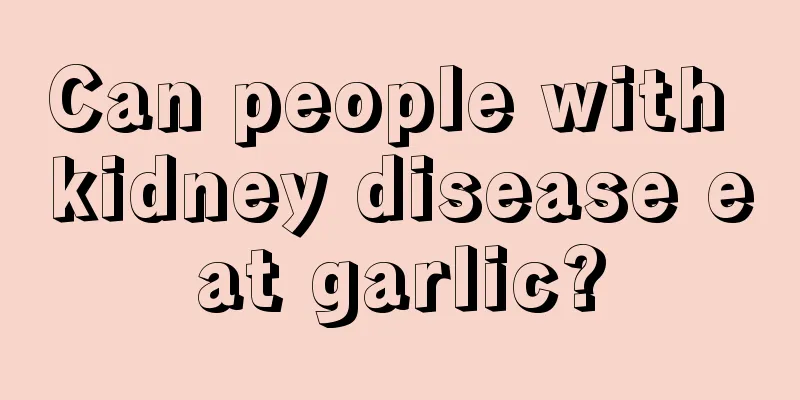Can people with kidney disease eat garlic?

|
Kidney diseases are common in our lives and are relatively serious. When patients are first infected and sick, they are usually related to the urinary system. If they are not treated for a long time, they are likely to cause kidney failure or uremia. In order to protect our kidneys, we should eat more foods that can protect the kidneys. So, can people with kidney disease eat garlic? Garlic has the effects of promoting the flow of stagnant qi, warming the spleen and stomach, eliminating symptoms, detoxifying and killing insects. It is used to treat food stagnation, cold pain in the abdomen, edema, diarrhea, dysentery, malaria, whooping cough, carbuncle, tinea, ringworm, snake and insect bites. Although garlic has such functions in preventing and curing diseases, it does not mean that the more you eat, the better. Eating too much raw garlic can easily cause heat, consume blood, affect eyesight, and also irritate the gastrointestinal tract. Therefore, people with yin deficiency and hyperactivity of fire, gastritis, gastric ulcer, duodenal ulcer, nephritis, heart disease and constipation should not eat too much. Because garlic has a strong lethality, while killing pathogenic bacteria in the intestines, it will also kill the beneficial bacteria in the intestines, causing vitamin B2 deficiency, and making it easy to suffer from skin diseases such as angular cheilitis, glossitis, and cheilitis. Therefore, it is more scientific to recommend eating 3 to 4 cloves of garlic every day, but it cannot be eaten on an empty stomach or taken with honey at the same time. Don't eat too much during pregnancy. Reducing the protein content in the diet can improve azotemia, reduce the damage to the kidneys caused by proteinuria, and help lower blood phosphorus and alleviate acidosis (because protein intake is often accompanied by the intake of phosphorus and other inorganic acid ions). Generally speaking, 0.6 grams of protein per kilogram of body weight per day can meet the body's physiological needs and prevent malnutrition. Therefore, patients with chronic kidney disease only need to consume 30 to 36 grams of protein per day. The choice of protein food should be mainly fish, lean meat, chicken and milk. Eating too much will not only fail to provide nutritional needs, but will aggravate the phenomenon of proteinuria. The effect is better when compound alpha-keto acids are added to a low-protein diet. Because alpha-keto acids can bind nitrogenous waste products from protein metabolism and convert them into nutrients. In addition, ensure adequate daily calories, 30 to 35 kcal per kilogram of body weight per day. If the calorie intake is insufficient, it will cause the decomposition of body tissue protein and increase the production of nitrogenous waste. Patients with chronic kidney disease often suffer from vitamin deficiency, which is related to dietary restrictions on the one hand and metabolic abnormalities caused by the disease on the other. Especially foods such as B vitamins, vitamin C, and folic acid. Most of these vitamins are found in fruits and vegetables, such as tomatoes, rapeseed, leeks, citrus, hawthorn, etc. Pay attention to water and electrolyte intake Chronic kidney disease patients should limit water intake when they experience edema, oliguria or anuria. Total water intake = insensible water loss - endogenous water loss + sensible water loss + urine volume of the previous day. Insensible water loss = 700-1000cc (loss through lungs and skin); endogenous water = 300-400cc (produced by metabolism in the body); sensible water loss = vomiting, diarrhea or drainage. Sodium control mainly means eating less salt. Under normal circumstances, it should be controlled at 5 grams per day. When symptoms such as edema, hypertension, or uremia occur, the intake should be limited to less than 3 grams. At the same time, avoid eating any pickled, canned or processed foods. When cooking, you can use sugar, white vinegar, wine, garlic, five-spice, pepper, coriander, tomato sauce, etc. to make the food more delicious. 1. The diet should be light and easy to digest. A light and easily digestible diet is very helpful in reducing the burden on the kidneys. On the contrary, spicy, irritating and difficult to digest foods will further damage the kidneys and may even be life-threatening. 2. Regulate urine acidity and alkalinity. Patients can eat more alkaline foods to regulate the acid-base balance in the body, which is very helpful for physical recovery. In addition, acidic foods can acidify urine and further regulate the acid-base balance in the body. 3. Drink plenty of water: Patients with pyelonephritis should drink plenty of water during the onset period to increase urine volume and promote the excretion of waste and toxins in the body. 4. Provide rich nutrition, including sufficient calories, sufficient amount of high-quality protein, and supply of vitamin A, vitamin B1, vitamin B2, vitamin C, etc. |
<<: Is garlic good for the heart?
>>: What is the best way to eat garlic
Recommend
How to peel tomatoes
We also call tomatoes tomatoes. They are a common...
Why don't I feel like eating all day?
Eating and sleeping are both normal physiological...
How to clean the fume hood
It symbolizes that every household has a range ho...
Exercises suitable for ovarian tumors
Many people believe that ovarian tumor patients a...
What are the hazards of ultrasound to the human body
Technology is developing very rapidly now, and me...
What is the more reliable way to treat pituitary tumors
What is the more reliable treatment for pituitary...
What's going on when centipedes appear at home?
Animals like centipedes and snakes are the ones t...
What to do if your nose is dry
In some dry seasons, many friends will feel dry n...
How many new cases of cervical cancer are there each year in the world? What should we pay attention to in preventing cervical cancer?
Cervical cancer is one of the most common maligna...
I feel pain in my lower abdomen, what's going on?
In our daily lives, we often feel various discomf...
Which hospital is best for treating lymphoma
Lymphoma, also known as "lymphoma", is ...
There is a lump on the inside of my ear
The ear is one of our important organs. Some peop...
What happens if there are horizontal lines on the ears? What are the impacts?
The ear is one of the five most important senses ...
Stye in the eyes and its treatment
We have seen many people with stye in their eyes....
Ranking of foods high in vitamin K?
In daily life, adults generally do not lack vitam...









